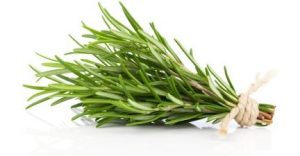- Increase blood circulation to the brain
- Increase memory retention
- Reduce inflammation
- Treat Alzheimer’s
- Reducing the severity of asthma attacks
- Relieve pain
- Protect the immune system
- Improved concentration,
- Improved digestion
- vomiting
- spasms
- coma
- pulmonary edema (fluid in the lungs)
- 1 tablespoon bentonite clay
- 2 drops essential oils of each
- 1 tablespoon yogurt
- 1 tablespoon raw honey
- 4 drops lavender essential oil
- 1 drop of tea tree essential oil (optional)
- In a small bowl mix the bentonite clay, yogurt, honey and essential oils until thoroughly combined.
- Apply the mask evenly to your face and let it stay on for 10 to 20 minutes.
- Wash with lukewarm water.
- 1 package (1/4 ounce) active dry yeast
- 1/4 cup plus 1/3 cup warm water (110° to 115°), divided
- 1/2 teaspoon honey
- 2 cups all-purpose flour, divided
- 1 tablespoon olive oil
- 1 teaspoon minced fresh rosemary
- 1/2 teaspoon kosher salt
- 1 tablespoon olive oil
- 1 teaspoon minced fresh rosemary
- 1/2 teaspoon kosher salt
- In a small bowl, dissolve yeast in 1/4 cup warm water; stir in honey. Add 1/4 cup flour; mix until almost smooth. Let stand 30 minutes or until bubbly.
- Place remaining flour, remaining warm water, oil, rosemary and salt in a food processor; add yeast mixture. Process until dough forms a ball. Process 1 minute more to knead dough, pulsing as needed.
- Transfer to a greased bowl, turning once to grease the top. Cover with plastic wrap and let rise in a warm place until doubled, about 1 hour.
- Preheat oven to 425°. Punch down dough. Turn onto a lightly floured surface; divide and shape dough into six balls. On greased baking sheets, pat each ball into a 5-in. circle. For topping, brush tops with oil; sprinkle with rosemary and salt. Bake 8-12 minutes or until golden brown. Serve warm. Freeze option: Freeze cooled flatbreads in a re-sealable plastic freezer bag. To use, thaw at room temperature or, if desired, microwave each flatbread on high 10-15 seconds or until heated through.
Written by Jasmine Franklin on Feburary 20, 2019.
Plants have always been a part of my life. My parents believed in the holistic elements to certain plants and was always quick to look there first. They always worked hard to create something to pass on to us, which is why I decided to start the Herb Shop! I want to share where I'm from, where a lot of our medicinal fixes originated from, as well as, shine a light on the multifaceted uses of common plant life that we look past every day.

Rosemarinus officinalis or Rosemary
The name Rosemary originates from the Latin word Rosmarinus, meaning “mist of the sea” or “dew of the sea”. Usage of rosemary dates back to 500 B.C. when it was used as a culinary and medicinal herb by the ancient Egyptians, Greeks and Romans. Rosemary is a member of the mint family Lamiaceae, much like basil or oregano. Rosemary is a Mediterranean native herb that possesses several benefits, some clinically proven while others are more centered on historical observation. Though the herb is most famous for being used in fragrances or to flavor food, it has quite a few medicinal uses that should be brought to the table.
Health Benefits
There are many different health benefits to rosemary. Rosemary is a good source of Vitamin A, Thiamin and Magnesium, and a very good source of Dietary Fiber, Vitamin C, Vitamin B6, Folate, Calcium, Iron and Manganese. Scientists have found that rosemary may also be good for your brain. Rosemary contains an ingredient called carnosic acid, which can fight off damage by free radicals in the brain. Some studies in rats have identified that rosemary might be useful for people who have experienced a stroke. Rosemary appears to be protective against brain damage and might improve recovery. Here is a brief list of some ailments that are said to be curable/treated with the use of rosemary:
WARNING: Rosemary is usually safe when taken in low doses. However, extremely large doses can trigger serious side effects, although this is rare. Side effects include:
High doses of rosemary may cause miscarriage; therefore it is not advisable for pregnant women to take any supplemental rosemary.
Other Uses
There are so many ways to utilize rosemary. The herb has been used in soaps, candles, fragrances, oils, creams, lotions, and more. The nutrients of rosemary can help protect skin cells from damage often caused by the sun and free radicals. Since rosemary has natural antiseptic properties, it's a superior disinfectant for our skin and hair. In fact, this essential oil is known to promote a healthy, moisturized scalp and reverse premature graying. If you suffer with acne, then this quick Rosemary Acne Mask (full recipe found on website) will make your day.
Ingredients Needed:
Steps:
Recipe of the Day
You can always count on rosemary to bring an intense, earthy touch to anything stewed, grilled or braised. Even adding it to a dessert has proven to be a great idea, because it gives the dish another level of depth. I decided to go with a simple yet timeless original for our recipe of the day, Rosemary Flatbread (full recipe found on website).
Ingredients Needed:
Topping(s)
Steps:
Sources:
https://www.medicalnewstoday.com/articles/266370.php
http://justfunfacts.com/interesting-facts-about-rosemary/
https://www.naomiwhittel.com/diy-face-mask-for-acne-prone-skin/
https://www.tasteofhome.com/recipes/rosemary-flatbreads/



